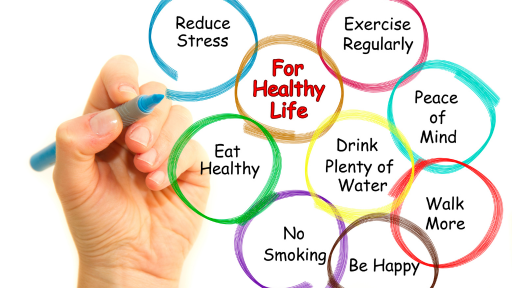Overview of the OMS program: Evidence-based strategies for living well with MS

What is the OMS Program?
The Overcoming Multiple Sclerosis (OMS) program was developed by Professor George Jelinek, a medical doctor who was diagnosed with MS in 1999. It is a holistic comprehensive approach to managing MS. The program is grounded in scientific research and has helped thousands of people with MS improve their overall well-being and reduce or even halt disease progression. OMS is heavily influenced by the Swank Diet which was founded by Dr. Roy Swank. His research advocated to reduce saturated fat intake which is also a big part of the diet recommendations in the OMS program besides other parts of the program.
Here are the seven pillars of the OMS program:
- Diet: The OMS diet consists of a plant-based whole food diet (all fruits and vegetables) as well as whole food grains. It excludes all dairy products (such as milk, cheese, yoghurt, butter) as well as meat. Fish and seafood is part of the OMS diet unless you wish to be completely plant-based as many OMSers are. It is important to minimize the saturated fat intake in the diet. Many people following a healthy diet report improvements in their symptoms and prevent or slow the disease progression.
- Sunlight and Vitamin D: If you live in a place where you can get sun, it is recommended to do that for 15 minutes daily without sunscreen to absorb UVB light which is needed to produce vitamin D. In many parts of the world, sunlight is too scarce, or UVB levels are too low to produce enough vitamin D, so taking supplements is recommended. When you are unsure, take a blood test to see what your vitamin D level is. The OMS program recommends to have 150nmol/L (60ng/mL in the US) which means that many people need to take at least 5000 IU (or more) to maintain these levels.
- Exercise: Many people may struggle with fatigue, mobility or bladder issues but starting slowly and working your way up to a regular routine is important to combat fatigue, to help with physical and mental wellbeing. If you are unsure what to do or where to start read this article (link to the exercise article).
- Meditation: When you start on the OMS program, meditation can be a pillar that is often overlooked especially if you are new to it. Many people (and that was me too) focus on the diet first and work their way up to meditation but a regular practice has been reported to reduce symptoms for some people. As you may know stress can be one reason why people have relapses so meditation can have a positive impact not only on stress reduction but also on better sleep and better cognitive function. When our body is stressed hormones are released that contribute to inflammation so keeping these at bay, can be very helpful. OMS recommends to meditate 30 minutes a day. If you are new to meditation, start with 5 minutes and work your way up. There are so many resources on the internet for free. Some apps and websites are free or charge a small fee. If you would prefer to be with a group and/or a teacher, look for a meditation class or retreat near you to get you started.
- Medication: Today, there are many different medications to choose from. None of them is a cure but they can help slow down the progression of the disease. This in combination with a healthy lifestyle of a whole-food mainly plant based diet, exercise and meditation can slow or halt the progression of the disease. Research suggests that the combination of medication and a healthy lifestyle can be the best bet for a happy healthy life.
- Prevention in Family Members: Having children and having MS, can be a scary outlook. MS is not a hereditary disease but to develop MS, one has to have the genome. The chance of developing MS is higher if you have a parent or sibling that has the disease than the general population however it is not guaranteed. Living a healthy lifestyle with a diet suggested here, exercising, keeping stress levels down and not smoking, can have a positive influence not to develop MS.
- Change your life, for life: When you are on the OMS program all of these changes can be overwhelming. It is not a “quick-fix” diet or a 30-day workout routine to lose weight. It is finding a way of living happily by adoption all the principles described here. At first this may seems a lot but over time it simply becomes the way you live and most people (like me!) feel it is just the way you live and you start to embrace it.
I first learned about the Swank diet and after adopting it and delving into it, I found on the Swank forum, the OMS program. The outlook was so positive that I switched pretty fast. At first, I did the diet very strictly which led to falling off the wagon a year later. Now after 12+ years, I feel I am most comfortable with all parts. I exercise, I meditate daily and I adhere to this way of eating. It took a long time for me. Don’t expect that such changes, happen overnight. Be kind to yourself and find the way that works best for you (some do cold turkey, others work one one part after the other). You will your way!
For more information on the OMS program click here: https://overcomingms.org/

Other Blog Posts

Isn’t Lifestyle Medicine Good For Everyone?
That isn’t even debatable anymore. It doesn’t matter if you are healthy or suffer from one of the many lifestyle diseases there are such as obesity, cardiovascular disease, cancer, type 2 diabetes etc. It keeps you healthy or makes you...

The Role of Nutrition in Managing MS: Top Foods to Include in Your Diet
When we think about nutrition in the context of Multiple Sclerosis (MS), we often think which is the food that is best to put into our body? But is it that white and black? In some ways, I think it...

Mindfulness and Meditation for Managing MS Symptoms and Improving Well-being
Multiple Sclerosis (MS) can be challenging, but it’s important to remember that many individuals with MS lead fulfilling lives. There are many things that can be done actively by someone living with the illness and meditation is one of them....

Exercise and MS: Types of Workouts and Why It is Important
You have been diagnosed with MS (or you have been living with the disease already longer) and you have come across how important exercise is for people living with MS and how it can influence the progression in a positive...

My Meditation Journey and Why I Think Headspace is Amazing
The beginning At the end of 2015, a few months after my husband and I got married, he said to me, “Do you want to do a 10-day silent Vipassana retreat?” Vipassana-what? 10 days meditating? No talking? You must be...

My Personal Journey With MS and How It Inspired the Coaching Program
George Jelinek had the brains and opportunities as a doctor to put the amazing OMS program together that it now Many of us are so immensely grateful to him and his work. I remember the first 10 years of my...